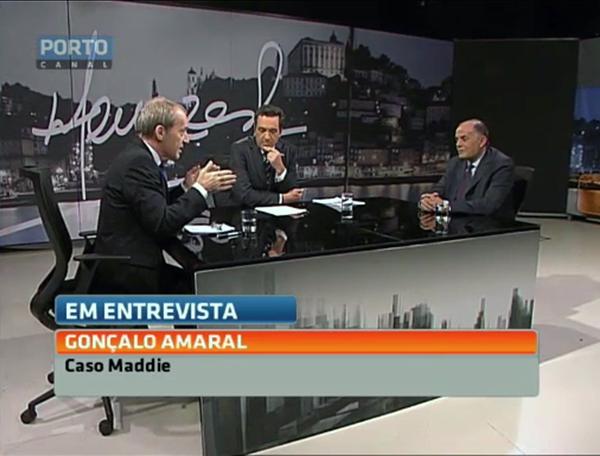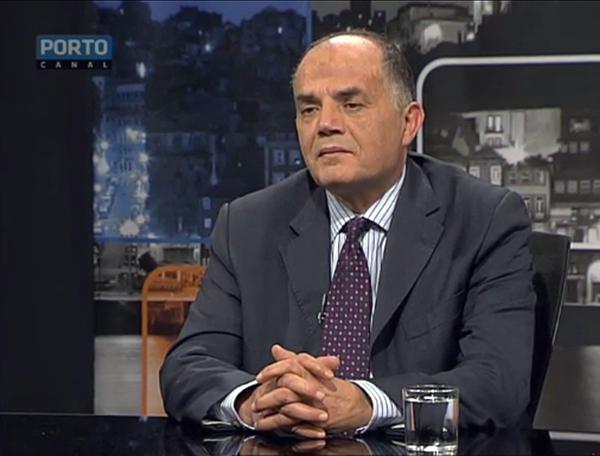Madeleine latest: raising
yet more questions
As news of the Met’s latest Madeleine
theories sweeps the world, here in
Portugal some very different revelations
- equally chilling in their content -
received almost zero publicity.
An interview with ‘infamous’ Madeleine
cop, Gonçalo Amaral, described how vital
leads in the case appear to have been
deliberately dropped.
Far from expounding on the possibility
of a sexual predator stalking the
bedrooms of young white girls on holiday
from England, Amaral talked of
high-level political involvement which
left DNA samples untested and key
witnesses overlooked.
It could have been dismissed as another
conspiracy-theorists’ stunt apart from
the fact that the programme was
presented by well-known news anchor
Júlio Magalhães - former director of
information at TVI and current
director-general of
Porto Canal - with questions fielded
by respected political thinker and
one-time PSD leader and mayor, Luís
Filipe Menezes.
Menezes opened the interview saying that
after almost seven years of media
frenzy, perhaps it was time to ask
whether the PJ was qualified to
investigate a crime of this complexity.
“Doubts arise as to whether our police,
our State, is protected against national
and international political influences
that interfere in the day-to-day
professional thinking of police and
other criminal investigators,” he said.
His invitation to Gonçalo Amaral -
awaiting the result of a trial for
defamation brought by Kate and Gerry
McCann, who allege his theories that
Madeleine is dead hampered the search
for their daughter - was a chance to see
whether the former investigator was “a
Portuguese version of Dirty Harry, or a
politically-correct policeman”.
Amaral’s answers came thick and fast.
The day he left the Madeleine
investigation was “the day Gordon Brown
(then British prime minister) spoke with
José Socrátes (then Portuguese prime
minister).”
At the time, Amaral told Menezes,
Portuguese police were keen to interview
the Irish family who had identified
Gerry McCann as the man they thought
they had seen carrying a child down
towards the beach on the night Madeleine
went missing.
This plan was quickly scuppered.
Amaral’s substitute on the case “was
told that it was not relevant to bring
the Irish (family) to Portugal,” he told
Menezes. “And that was that. The Irish
family was never heard.”
As to DNA evidence that was discovered
in the McCanns’ rental car, Amaral was
adamant that this could have been more
thoroughly tested. While initial
findings on blood were deemed
inconclusive, Amaral explains hair
samples were simply not followed up as
British lab technicians claimed it was
impossible to test hair samples without
roots.
“It is possible, and even at the time it
was possible!” Amaral insisted.
“These hair samples are in Portugal!
They were returned in Portugal and they
are in the files. It’s simple! All the
public ministry has to do is take the
hairs and send them to a European
laboratory, or anywhere where these
kinds of exams are done without roots.”
Menezes, who had described himself at
the outset as “never neutral in these
matters” but seeking to be impartial,
quizzed Amaral on one of the myriad
“strange twists” in the early stages of
the case.
Referring to the hiring of Clarence
Mitchell as the McCanns’ press 'face',
he said: “How is it comprehensible that
the spokesman for the English Prime
Minister had left, in 24 hours, Tony
Blair to be the McCann family’s
spokesman? Isn’t that strange?”
“Of course,” replies Amaral. “It is
another mystery within the mystery, and
maybe if we can understand this little
mystery we will be able to understand
what lies behind, not the disappearance,
not the death of the child, but what
lies behind the protection… Why the
protection…”
Full of questions and inconvenient
allegations, it was an interview that
aimed to illustrated the depth and scope
of the “complexities” Luís Filipe
Menezes had suggested might just be too
much for the PJ - or indeed any police
force.
“Only when there is the political will
on both sides” will the case be
resolved, said Amaral, concluding, “when
investigations are politically correct,
they lead nowhere.”
Meantime in UK, Operation Grange has
revealed that it is currently receiving
hundreds of calls in response to the
latest announcement that a bare-chested
sexual predator abused five little white
girls - all older than Madeleine – while
they were sleeping in their beds in
holiday homes along the Algarve between
2004 and 2006.
The Met described 12 separate crimes
leading up to 2010, only four of them
involving the sexual abuse of girls aged
7-10.
Whether the other eight crimes involved
another type of sexual abuse has not
been divulged.
According to Correio da Manhã newspaper,
it was the evidence of this predator
that led Portuguese investigators to ask
the public ministry to reopen the
Madeleine case in October last year.
Characteristically tight-lipped about
the course of their investigations, the
PJ nonetheless have been known to feed
information to the Portuguese and
foreign press.
On Wednesday (March 19), a spokesman
agreed with the Met’s Detective Chief
Inspector Andy Redwood that the new
suspect is considered to be a key to
resolving the long-running mystery, just
over a month away from reaching its
seventh anniversary.
By NATASHA DONN |



